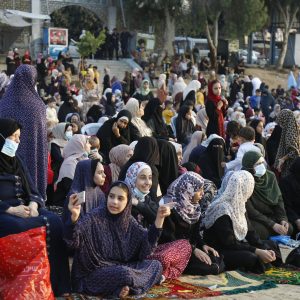Israel is ‘choking’ Gaza hospitals, US doctor says after medical mission
Just under a month after returning home from a medical mission to Gaza, two US doctors and a nurse visit Washington to warn White House and congressional officials that Palestinian civilians are dying at Khan Yunis’ European Hospital because of restrictions imposed by Israel in the way of medical supplies.
Ammar Ghanem, an intensive care doctor from Michigan, says the shortage of medical equipment is so severe that it forced health-care workers to ration care. “It’ll break your heart when you make a decision like this — prioritizing some patient’s life over others, because some of them are hopeless and you want your resources to be saved for a patient that you have some hope with,” he says.
Ghanem feels compelled to convey the message of his colleagues in Gaza. He describes that doctors in Gaza don’t feel safe: “They feel fear inside them — especially with the escalation that happened lately — that the hospital, the European Hospital we worked at, is going to be getting invaded and they will get killed.”
He shares the dilemma doctors face every day in the midst of incapacitated medical facilities — to prioritize saving some lives over others. “We come to the point… (where) we are running out of supplies to do a dressing for that kid. And then we decided we probably should divert our resources to some other patients that have a higher chance of surviving. So it’ll break your heart when you make a decision like this — prioritizing some patient’s life over others, because some of them are hopeless and you want your resources to be saved for a patient that you have some hope with.”
The medic also expresses his anger over the repeated cessation of humanitarian aid. “There’s no reason, there’s no reason whatsoever to not allow medical missions and not allow supplies to go in. We are against the killing of civilians anytime, anywhere, from any side. And then the solution is not by escalating more and killing more civilians, especially a majority of the civilians are women and young children. This is so heartbreaking. And now they are choking the health system so nobody can survive.”
Monica Johnston, a nurse for burns victims from Portland, Oregon, shares: “Going there, I just thought that I’d be able to help the best I can, offer what support I could. But coming back is what I didn’t quite realize would have such an effect on me, because of these relationships we built, the injustices that I saw, all the children that were dying, the families that were gone. And I feel that I can’t sit back and not share this stuff.”
Adam Hamawy, a plastic surgeon from Princeton, New Jersey, says that the “level of civilian casualties that I experienced was beyond anything I’d seen before. I had not experienced the number of children that I was seeing, in this case. The number of burns were much higher than what I’ve seen in the past, families that were coming in. I saw very few combatants or possible combatants in this. And that’s not what I’d experienced in war in the past.”
Johnston shares her harrowing experience without basic necessities. “We found three patients dead upon our morning arrival in the ICU during our time there… You walk in, the first thing you’re supposed to do is wash your hands before you touch a patient. We didn’t have soap, we didn’t have paper towels, no hand sanitizer. So you’re already potentially hurting and harming your patient by assessing them without clean hands.”








